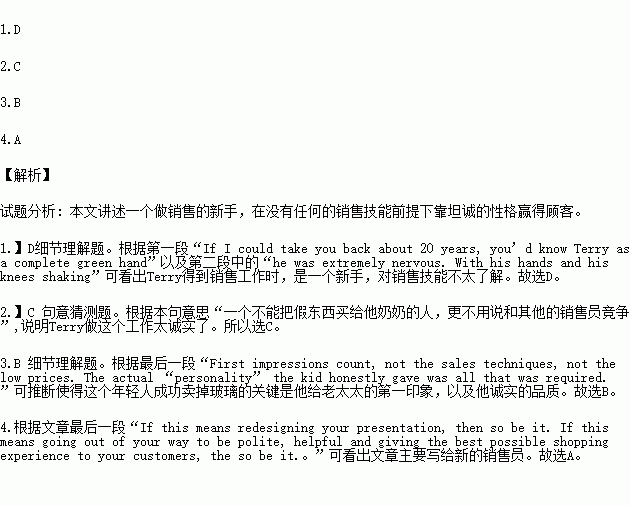题目内容
Allow me to introduce you to Terry, a window salesman from England. If I could take you back about 20 years, you’d know Terry as a complete green hand, who was wet behind the ears in just about everything he attempted. A person couldn’t sell false teeth to his own Granny, let alone he could compete with the other salespeople in the industry. You know, the kind who could sell snow to Eskimos.
Terry’s boss decided to send him out on a practical field trip on his first day. So off he went, but he was extremely nervous. With his hands and his knees shaking, he approached the front door and knocked at is. And old woman appeared. After dozens of cups of tea and pieces of biscuits, the woman signed a contract and purchased over $7,000 worth of windows.
The woman had already talked with 6 excellent salesmen that week, all of whom offered her cheaper ones! That’s right---Terry’s price was the most expensive and he was also the most inexperienced salesman there ever was.
So, what happened then? Here comes the secret. The woman said she liked the young lad more than the others. That’s all there was to it. She didn’t care about the extra expense. Even the other salesmen couldn’t persuade her to pay less than this young lad was asking for.
The truth is that the young lad left on the woman the first impression that shone brighter than any of the salesman’s talk. First impressions count, not the sales techniques, not the low prices. The actual “personality” the kid honestly gave was all that was required. If you market your own products and services, consider what impression you are giving to others. If you appeal to them, then you’ve already done half of the work. If this means redesigning your presentation, then so be it. If this means going out of your way to be polite, helpful and giving the best possible shopping experience to your customers, the so be it.
1.When Terry was offered the job of salesman, he .
A. was good at sales techniques
B. was too young to do it
C. was believed in by his boss
D. knew little about sales skills
2.The underlined sentence in Paragraph 1 suggests that .
A. Terry couldn’t trade with Eskimos
B. Terry loved his Granny more
C. Terry was too honest to do the job
D. Terry was afraid to compete
3.What made the young lad succeed in selling the window to the old woman?
A. Being honest and childish.
B. First impression of good personality.
C. High quality and expensive window.
D. Strange ways of sales.
4.The passage is most likely written to .
A. new salesmen
B. general readers
C. window makers
D. new graduates
 阅读快车系列答案
阅读快车系列答案
